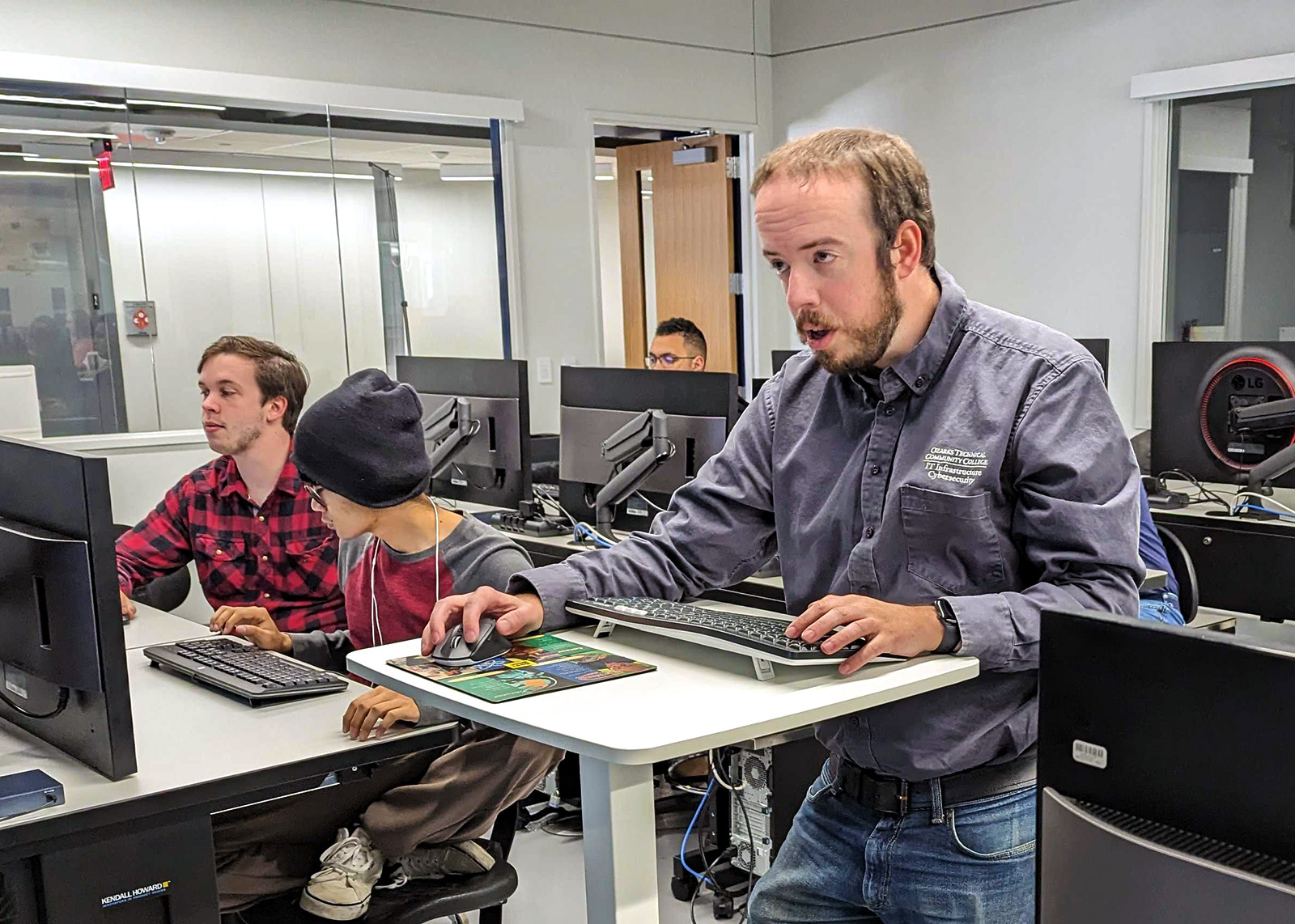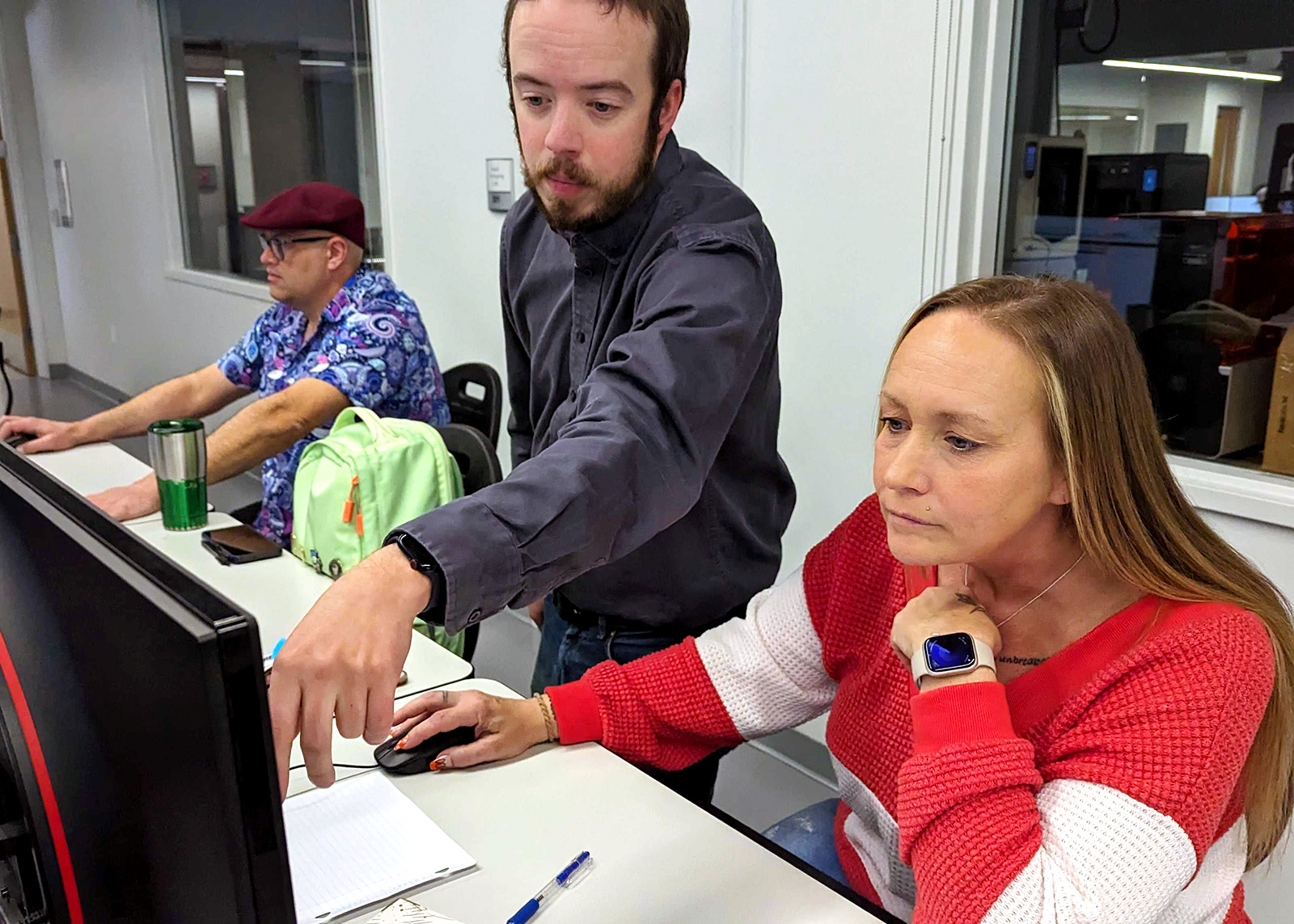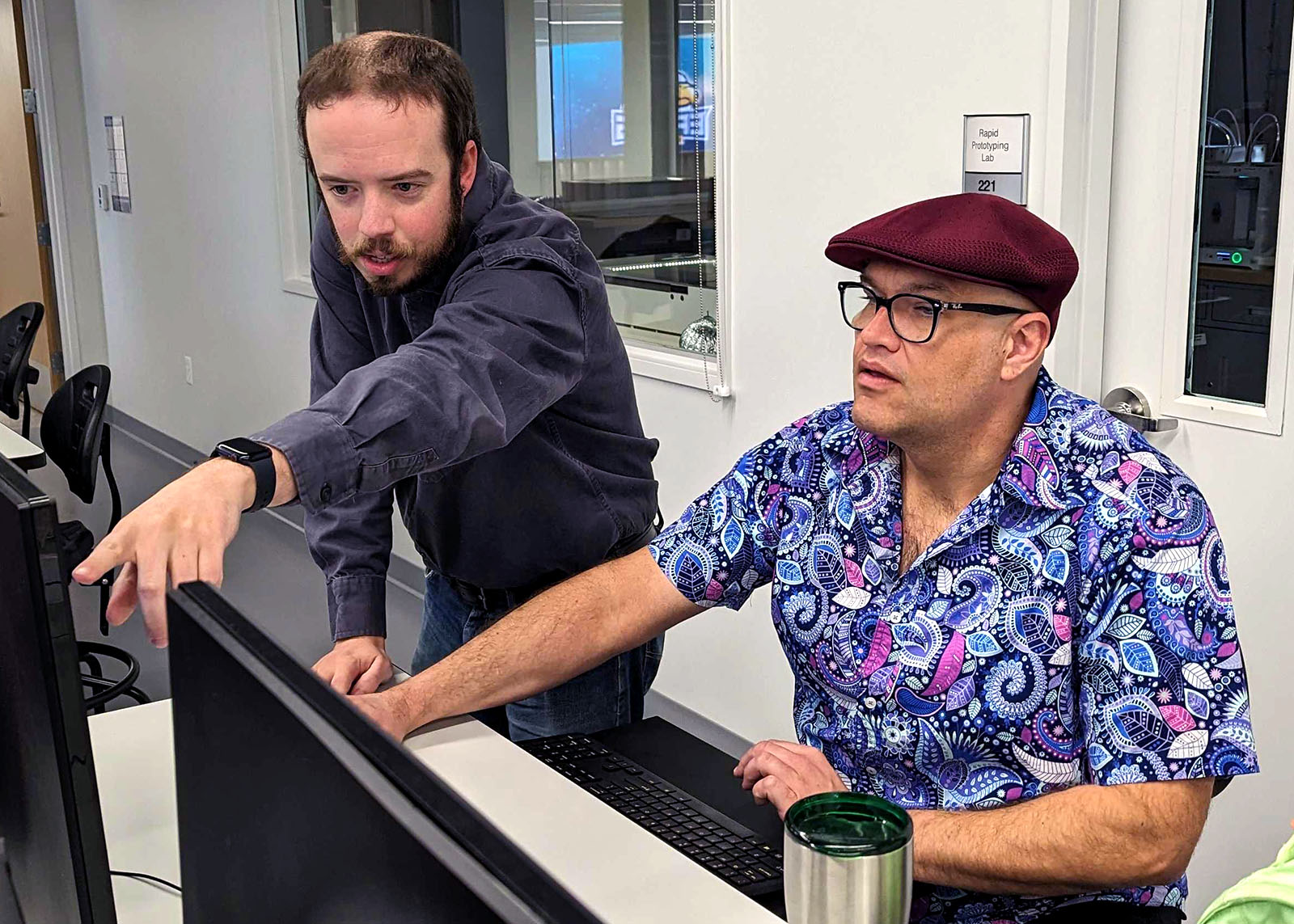Jennifer Collins is learning how to spot single points of failure.
A few years ago, the 41-year-old Springfield woman was working in the restaurant industry, working her way from a server to a sommelier, or the person who chooses wines for restaurants to serve. The COVID-19 pandemic stopped that plan cold, leaving her to wonder what was next after restaurants shut down.
A career shift to the cybersecurity industry caught her attention. Collins is now in her second year of pursuing an associate’s degree in cybersecurity at Ozarks Technical Community College.
“A term we use in cybersecurity is called ‘a single point of failure,’” Collins said. “That gave me time and reason to think that if I wasn’t doing that, what could I do?”
After reviewing OTC’s programs, Collins followed a gut instinct and enrolled in cybersecurity. With a projected graduation date of May 24, Collins has been diving into PC repair and construction. She has become familiar with the LINUX operating system, and is now at the point where she needs to start thinking about narrowing her opportunities and directions a bit.
It’s an encouraging problem to have, when career opportunities are this vast, she said. So many job openings exist, and they all offer the chance to help people with something important.
“I think this has made my life a lot bigger,” Collins said. “I feel like I’m living a bigger life, where before I could maybe look at different restaurants, but now, I could move to Minnesota because there are opportunities there. I really do feel like I can do anything now.”

Bad actors create strong industry
The optimism from Collins’ future is generated by the cold reality of bad actors discovering how the internet age has opened up new criminal opportunities. Cybersecurity experts are in demand because the data placed on servers across the world has never been more personal or more valuable.
The cybersecurity program at OTC is one of the college’s most popular, said Tiffany Ford, department chair for information science at the college. It is also one of the OTC’s newest programs.
A total of 572 students are enrolled in the college's information science programs, which cover a range of industry networking certifications and operational structures. Students learn to play offense and defense in this game — they learn basics of protecting networks from hacking attempts, and in turn, learn how to search for weak areas where an intruder could gain complete access — that single point of failure.
Cybersecurity students, college instructors in demand

Ford said students who earn the degree can immediately enter the field and land an entry-level job with salary as high as $50,000 annually in a number of areas, from network administration to security audits — either defensive or offensive positions.
The Springfield college can’t turn out graduates fast enough for southwest Missouri employers, she said. OTC has four full-time instructors for the program, and is seeking to hire another, she said.
“We are sitting on a substantial wait list, despite all our efforts,” Ford said. “We try to give every student a seat if possible. With another full-time instructor, that opens up more opportunities.”
But hiring qualified cybersecurity instructors, who have a strong background in the field, is just as difficult.
Part of that is the changing nature of the field. While welding and construction techniques have not changed much, the book for fighting hackers and protecting data changes almost monthly, as new attacks and defenses develop.
“We want them to come in knowing how things work where they are from, so that we can then translate that into actual, hands-on, real-world scenarios,” Ford said.
Brandon Cain is one of the college’s instructors. He used to work for Pyramid Foods, running its network. He also worked for a software company, and joined the staff as an adjunct last year. He found the process of teaching exciting and fulfilling, he said, and enjoys showing students how the field evolves.
“It is constantly changing, and that’s challenging in itself, keeping up with that,” Cain said. “We go to conventions and other different types of professional development to keep up with things, and we change our curriculum every semester, making tweaks and adjustments. That’s part of the challenge, what I enjoy.”
Cybersecurity awareness

The safety of data has far-reaching implications, from our own personal wallets to the national security of the country we live in.
“Most recently, there was the ransomware attack for the casino in Las Vegas, which was clearly an attempt to extort for money,” Ford said. “But then you have attacks against organizations for data they can sell, whether they are selling that data to other organizations as a form of corporate espionage, or whether they are selling it for personal gain. Data is being sold to target ethnic groups.”
The federal government’s Cybersecurity Infrastructure Security Agency (CISA) is recognizing the 20th annual Cybersecurity Awareness Month, an effort to collaborate between public and private sectors about its importance.
CISA's Secure Our World program spotlights how individuals and small businesses can improve their own security through four steps:
- Creating stronger passwords.
- Using multi-factor authorizations.
- Recognizing and reporting phishing attempts.
- Updating software.
OTC’s program, however, shows a need for professionals who can handle larger, bigger organizations.
At the same time OTC offers training for future employees, it is also a customer. Mark Miller, spokesperson for the Ozarks Technical Community College, said it has five full-time employees on staff that defend the network from attacks and test it for exploits, using a number of audits that run as often as every other week.
Miller said those cybersecurity staffers sometimes test employees to see if they fall victim to phishing attempts. It is important because the college stores personal, educational and financial information on its students.
“We take this incredibly seriously,” Miller said. “A lot of what we do is because students get federal money and we get federal grants, so the (security) is mandated by the Department of Education.”
Important job, easy entry

Cain said cybersecurity employees are in an upper echelon of tech positions, because of the constantly evolving knowledge base.
The primary skill Cain teaches students has nothing to do with tech, technically.
“Healthy paranoia can be a thing,” Cain said, joking. “But critical thinking is paramount in any IT field. We are constantly trying to make adjustments, and create that environment for critical thinking. It’s not just memorizing and googling things.”
Like other programs at the college, its cybersecurity program does not require previous knowledge in the field, or educational prerequisites. Ford said while a person knowing their way around a computer helps, the program is designed to take students from the street to a job in the industry, no matter what they are doing now.
Collins is excited about the prospect, and looking forward to landing a job that offers full benefits, she said – a nice change from the restaurant industry. While she had no idea two years ago, that cybersecurity would be her future, the impact she can have on people’s lives has been a fulfilling surprise.
“I feel like I had the general idea that there are all of us regular people, and then there are hackers out there, and we can’t do a lot about it. But there is a lot that we can actually do,” Collins said. “Maybe I can be part of that in the field. Because I don’t come from a tech background, I can communicate that to people how they actually have a lot of power to protect themselves.”
Reporter's note, Oct. 12, 2023: This report has been edited to correct a previous employer and OTC's terminology for class subjects.

